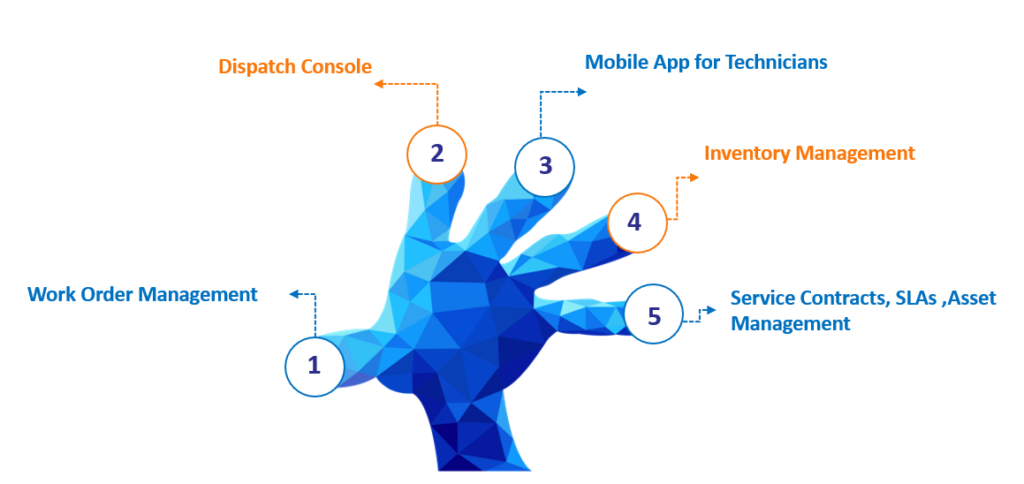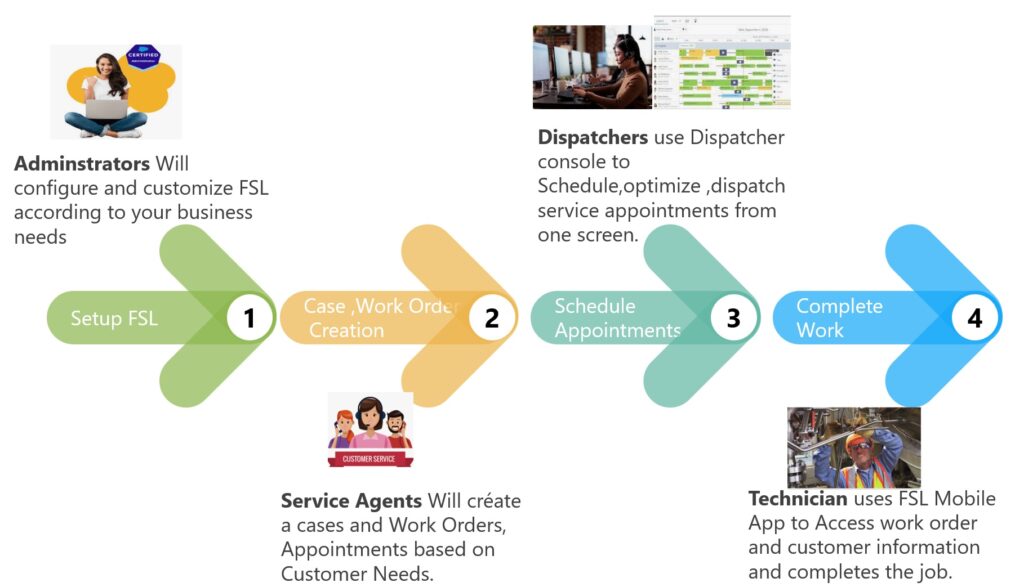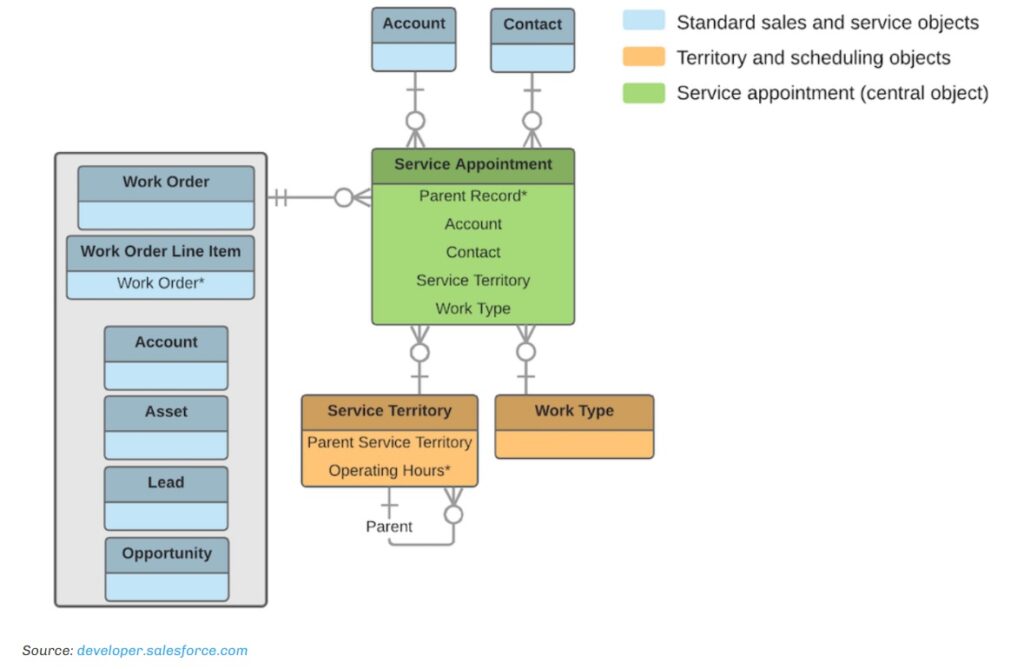
What Is Salesforce Field Service Lightning?
Field Service Lightning is a Salesforce Product, which provides comprehensive solutions to Workforce Management. Field Service Lightning is an extension to Service Cloud, It is highly powerful, Customizable, and Mobile friendly with offline capabilities.
What are the key features of FSL?
Work Order Management: Field Service Lightning allows users to create, assign, and manage work orders efficiently. It provides a centralized view of all work orders, enabling real-time tracking of their status and progress.
Scheduling and Dispatching: The solution offers intelligent scheduling and dispatching capabilities, considering factors like technician skills, availability, location, and customer preferences. It helps optimize the allocation of resources and ensures that the right technician is assigned to the appropriate job.
Mobile Field Service: Field Service Lightning provides a mobile app for field technicians, enabling them to access work orders, customer information, and relevant documentation from their mobile devices. Technicians can update job status, capture signatures, and communicate with the back office in real-time.
Asset and Inventory Management: The solution allows businesses to track and manage customer assets, equipment, and inventory. It helps organizations monitor service histories, warranties, and maintenance schedules, ensuring timely and accurate service delivery.
Service Contracts and SLA Management: Field Service Lightning enables users to define service contracts and manage service level agreements (SLAs). It helps ensure compliance with contractual obligations, track service entitlements, and measure performance against service commitments.
Analytics and Reporting: The solution provides comprehensive reporting and analytics capabilities, allowing organizations to gain insights into key performance indicators (KPIs) such as service response times, technician productivity, and customer satisfaction. It helps drive data-based decision-making and process improvements.
A Typical FSL Process

FSL Data Model

What are the key benefits of FSL ?
- Enhanced Efficiency: FSL helps streamline and automate field service operations, leading to improved efficiency. It optimizes scheduling and dispatching processes, ensures the right technician with the appropriate skills and availability is assigned to each job, and minimizes travel time through intelligent routing.
- Improved Customer Satisfaction: By providing accurate and timely service, FSL helps enhance customer satisfaction. It enables real-time updates and notifications to customers, provides technicians with access to customer history and preferences, and allows for efficient rescheduling and tracking of service appointments.
- Mobile Enablement: FSL provides a mobile app for field service technicians, empowering them with access to relevant job details, customer information, and real-time collaboration capabilities. Technicians can update job status, capture signatures, and complete tasks on the go, improving productivity and reducing paperwork.
- Intelligent Insights and Analytics: FSL offers robust reporting and analytics capabilities that provide visibility into key performance metrics, such as service response time, first-time fix rate, and technician utilization. These insights help identify areas for improvement, optimize resource allocation, and make data-driven decisions.
- Seamless Integration with Salesforce: As part of the Salesforce platform, FSL integrates seamlessly with other Salesforce products and services. It enables a holistic view of customer data, supports end-to-end business processes, and facilitates collaboration across departments, such as sales, service, and marketing.
- Scalability and Flexibility: FSL can scale to accommodate the needs of growing field service operations. It offers flexibility in configuring processes, workflows, and service territories to match unique business requirements. Organizations can adapt FSL to their specific industry, service models, and evolving business needs.
- Field Inventory Management: FSL provides features for managing field inventory, ensuring that technicians have the right parts and equipment to complete jobs successfully. It tracks inventory levels, enables replenishment, and supports stock transfers, minimizing delays and improving first-time fix rates.
- Proactive Maintenance and Asset Management: FSL helps organizations shift from a reactive to a proactive maintenance approach. It enables the scheduling of preventive maintenance tasks based on asset usage, warranty information, or predefined service plans, reducing downtime and extending asset lifespan.
- Collaboration and Communication: FSL facilitates collaboration and communication between field technicians, dispatchers, and back-office teams. It enables real-time updates, messaging, and knowledge sharing, ensuring effective coordination and faster problem resolution.
- Customization and Extensibility: FSL can be customized and extended to fit specific business processes and requirements. It offers a range of configuration options, custom objects, and APIs, allowing organizations to tailor the solution to their unique needs and integrate with external systems.
What about License?
- Visit Salesforce page https://www.salesforce.com/in/editions-pricing/service-cloud/field-service/
About Author

Krishna Dadi
Krishna Dadi is a Salesforce Technical Architect at Aarkin with 12+ years of IT experience, he is 12X Salesforce certified and an active contributor to the Salesforce success community.
He worked with businesses of all sizes and industries, helping them to streamline their processes, improve their customer relationships, and drive growth through the use of Salesforce
He enjoys engaging in a variety of activities such as playing chess, delving into books, exploring unfamiliar destinations, and connecting with new individuals.